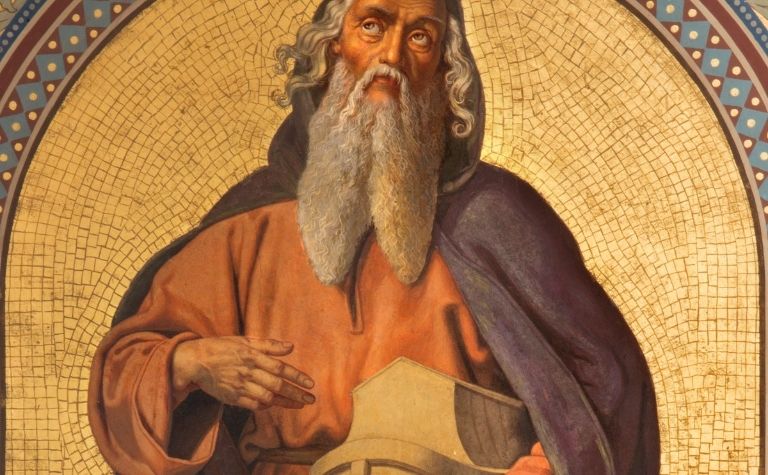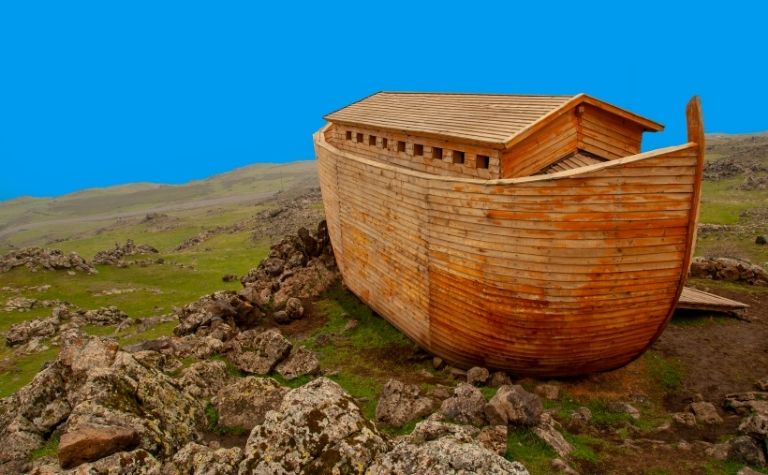The story of Noah’s ark, though sometimes represented as a children’s fairytale, is a powerful act of judgment that God rendered against a godless and rebellious world. Noah is the lone righteous figure in the narrative, and only he and his family are saved from the floodwaters. The story of Noah’s ark (Ch. 6-9) is significant to the Bible and has a profound message for all generations.
The message of Noah’s ark is that God will judge sin, yet in his grace, he shows mercy to those who have faith in him. Noah’s faith resulted in righteous living, immediate and thorough obedience to God’s instructions, and fellowship with his Creator. Noah foreshadows Jesus Christ, the Savior of the world.
What is the message of God’s judgment? What is the message of Noah’s salvation? How does the flood story describe Noah’s obedience? What does the New Testament teach about the cause of the flood? What did God promise Noah at the conclusion of the story? Keep reading to learn the answers to these questions and others.
Also see How Many Animals Were on the Ark? to learn more.

What is the message of God’s judgment?
The message of the flood is that God responds to sin with punishment. Sin is a failure to conform to God’s moral law. In his timing, according to his wisdom, God penalizes sinners. However, in his mercy and grace, he forgives repentant people and saves them. God fully expressed his love when he sent his son, Jesus of Nazareth, to die on the cross as a substitute for sinners and to pay the penalty for their sin.
In the context of the flood story, God judged those who rebelled against him because of the potency and frequency of their unrepentant sin. Genesis 6:5 reads, “The Lord saw that the wickedness of man was great in the earth, and that every intention of the thoughts of his heart was only evil continually” (ESV).
| Translation | Genesis 6:5 |
|---|---|
| KJV | And God saw that the wickedness of man was great in the earth, and that every imagination of the thoughts of his heart was only evil continually. |
| NIV | The Lord saw how great the wickedness of the human race had become on the earth, and that every inclination of the thoughts of the human heart was only evil all the time. |
| NKJV | Then the Lord saw that the wickedness of man was great in the earth, and that every intent of the thoughts of his heart was only evil continually. |
| NASB | Then the Lord saw that the wickedness of man was great on the earth, and that every intent of the thoughts of his heart was only evil continually. |
| NLT | The Lord observed the extent of human wickedness on the earth, and he saw that everything they thought or imagined was consistently and totally evil. |
The descriptive term “wickedness” comes from a Hebrew word (rah), meaning bad or evil. The verse describes the wickedness as “great.” The degree of depravity in the world before the flood is evident in the preceding verses, which describe the sin of the sons of god and the daughters of men (Gen. 6:1-4). The frequency and potency of sin in the pre-flood world resulted in God’s judgment.
People behaved in sinful ways because sin poisoned their hearts. Verse five not only reveals that the thoughts of people’s hearts were evil, but they were so completely (“every,” ESV) and perpetually (“continually,” ESV). In other words, their hearts weren’t sometimes evil or occasionally sinful. Not one thought of their hearts was pure, righteous, or holy — ever.
Verse six says he “regretted” making people. And verse seven describes what God “said” in response to what he saw and felt. God reacted to people’s wickedness internally before externally inundating the earth with floodwaters. Genesis 6:6 reads, “And the Lord regretted that he had made man on the earth, and it grieved him to his heart.”
5 New Testament verses that describe the cause of the flood
- People were obsessed with physical appetites: Luke 17:27 reads, “They were eating and drinking and marrying and being given in marriage, until the day when Noah entered the ark, and the flood came and destroyed them all.” (cf. Matt. 24:38)
- People had a general disregard for the sacredness of marriage: Matthew 24:38 reads, “For as in those days before the flood they were eating and drinking, marrying and giving in marriage, until the day when Noah entered the ark.” (cf. Luke 17:27)
- People were materialists: Luke 17:28 reads, “Likewise, just as it was in the days of Lot—they were eating and drinking, buying and selling, planting and building”
- People were faithless and unrighteous: Hebrews 11:7 reads, “By faith Noah, being warned by God concerning events as yet unseen, in reverent fear constructed an ark for the saving of his household. By this he condemned the world and became an heir of the righteousness that comes by faith.”
- People blasphemed God and rebelled against him: Jude14-15 reads, “It was also about these that Enoch, the seventh from Adam, prophesied, saying, “Behold, the Lord comes with ten thousands of his holy ones, to execute judgment on all and to convict all the ungodly of all their deeds of ungodliness that they have committed in such an ungodly way, and of all the harsh things that ungodly sinners have spoken against him.”
Also see How Long Did It Take Noah To Build the Ark? to learn more.

What is the message of Noah’s salvation?
The message of Noah’s salvation is that even though no one is sinless (Rom. 3:23), sinners can be saved through putting their faith in God. The Bible teaches that those who put their faith in God trust him for salvation, repent of godless living and embrace righteous living according to his moral standards. However, good works don’t save a person; they are evidence that a person is saved.
In the context of the flood story, Genesis 6:9 reveals three important truths about Noah that explain why God chose him to be saved. Bible translations render the descriptions similarly, yet there are differences, as the table below reveals. The numbers are provided so readers can easily make comparisons between the translations.
| Translation | Description |
|---|---|
| ESV | (1) Noah was a righteous man, (2) blameless in his generation. (3) Noah walked with God. |
| KJV | (1) Noah was a just man and (2) perfect in his generations, and (3) Noah walked with God. |
| NASB | (1) Noah was a righteous man, (2) blameless in his time; (3) Noah walked with God. |
| NIV | (1) Noah was a righteous man, (2) blameless among the people of his time, and (3) he walked faithfully with God. |
| NLT | (1) Noah was a righteous man, (2) the only blameless person living on earth at the time, and (3) he walked in close fellowship with God. |
The threefold description of Noah in Genesis 6:9 reveals that the motives and thoughts of his heart were unlike anyone else in the world at the time.
- Noah was righteous/just: Noah adhered to God’s moral standards. He lived according to God’s definitions of right and wrong in the context of a covenant relationship with him. At the time, the rest of the world lived according to their own standards, which their sinful nature dictated.
- Noah was blameless/perfect: The literal meaning of the Hebrew word is perfect or flawless. However, the description doesn’t mean that Noah was without sin. Genesis also uses the term to describe Abraham (Gen. 17:1). Readers can observe an illustration of Noah’s sin after the flood (Gen. 9:18-27).
- Noah walked closely/faithfully with God: This phrase refers to the fellowship that Noah had with God. Noah lived in close proximity to God in the sense that he had faith in him, obeyed him, and interacted with him. Genesis also uses the term to describe Enoch (Gen. 5:24).
Later generations knew Noah as a man of high character and great faith. For example, in the New Testament, Hebrews 11:7 reads, “By faith Noah, being warned by God concerning events as yet unseen, in reverent fear constructed an ark for the saving of his household. By this he condemned the world and became an heir of the righteousness that comes by faith” (ESV).
Also see Why Did God Flood the World? to learn more.

The flood story’s twofold message
Genesis scholar Gordon Wenham writes, “It is indeed a tale of catastrophic destruction that proves God’s hatred of sin, a picture of the wrath of God that will finally be revealed at the last day on all who ignore his demands and go their own way.”
He continues, “But it also offers comfort: God will continue to uphold the present natural order ‘as long as the earth exists,’ despite man’s incorrigible perverseness of heart. More than that, it gives assurance to the righteous, those who walk with God and keep his commandments, that in the last great day, or in the natural disasters that presage it, they too will be preserved unto eternal life.” [1]
Noah obeyed God
Noah’s faith in God resulted in obedience. The flood narrative in Genesis (Ch. 6-9) records several statements about Noah’s obedience in different parts of the story.
| Genesis 6:22 | “Noah did this; he did all that God commanded him.” |
| Genesis 7:5 | “And Noah did all that the Lord had commanded him.” |
| Genesis 7:9 | “two and two, male and female, went into the ark with Noah, as God had commanded Noah.” |
| Genesis 7:16 | “And those that entered, male and female of all flesh, went in as God had commanded him. And the Lord shut him in.” |
God’s covenant with Noah
After Noah exited the ark, God made a covenant with him and all future generations, promising never to flood the earth again.
Genesis 9:11-13 reads, “I establish my covenant with you, that never again shall all flesh be cut off by the waters of the flood, and never again shall there be a flood to destroy the earth. And God said, This is the sign of the covenant that I make between me and you and every living creature that is with you, for all future generations: I have set my bow in the cloud, and it shall be a sign of the covenant between me and the earth.”
Also see How Big Was Noah’s Ark? to learn more.
References:
[1] Genesis 1-15 by Gordon Wenham. WBC. p. 208.
[2] Source
Related Questions
The Book of Enoch has fascinated historians, theologians, and other interested readers for over two millennia. Some call it "1 Enoch," as there are other ancient writings named after the patriarch....
Noah stands out to Bible readers because of the flood story. Yet, he first stood out to God because of his righteousness (Gen. 6:9). The New Testament mentions Noah, along with Abraham, Moses, and...
